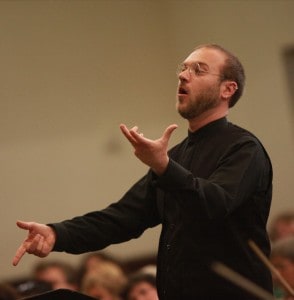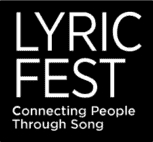LYRIC FEST – THE BAWDY BARD, September 2011.
Interview with Matthew Glandorf, Artistic Director of Choral Arts Philadelphia and The Philadelphia Bach Festival.

LF: What was your immediate reaction when Lyric Fest invited you and Choral Arts Philadelphia to collaborate on The Bawdy Bard?
MG: I was really excited about doing a song program of Early music, which has become my passion and specialty in recent years. It is an interesting challenge to design a program that focuses on music from the Middle ages to the Early Baroque, incorporating soloists, ensemble, choir and instruments. So, we have assembled a true bard ensemble. It makes it lovely to explore different kinds of music and topics that were – and still are – important.
I’ve always loved the challenge of telling a story throughout a concert, and this will be a perfect opportunity to do that.
LF: What is the story idea for this program?
MG: Our concept is to look at the art of the common song from Medieval through Renaissance and early Baroque, and a Medieval-inspired modern work.
We are presenting a wide range of music, songs written in a span of over 500 years. With the exception of the one modern composition, everything on the program is from the 1600’s and before, with not even a familiar song from the mainstream Baroque repertoire. This kind of program is not heard very often.
We start off with Can vei de lauzeta by Bernard de Ventedorn which is probably the earliest ever written mover, which is an English medieval song performed as a round. We will explore various common themes like awakening of the earth in the summertime and a tale of seduction in a Medieval mini-drama between a shepherd and a shepherdess. We will sing Janquin’s Le chants des Oiseaux (c. 1520), literally “The Song of the Birds” in which the singers imitate various bird calls. It is totally fun and we are pairing it with a modern piece by Mark Rimple that echoes and comments upon the same theme, but in a new style.
Throughout the program, we explore an abundance of themes: from nature, to seduction, the budding of romance, unrequited love, pain of a love lost (two troubadour songs from 12th century, one by male and one – by the only female troubadour). And for good measure – we add Purcell’s drinking songs from the 17th century, and end the program with the triumph of love in three songs by Giovanni Giacomo Gastoldi, an Italian composer of the late Renaissance.
LF: Tell us about the modern piece by Mark Rimple:
MG: It’s entitled Nouveau Chanson des Oiseaux and will be performed for the second time since its premiere in 2003, when it was originally commissioned for a choral ensemble In Clara Voce, which I conducted at the time.
The piece is written for soloists and full ensemble and is based on an old text, an anonymous medieval poem Mark had discovered. This is a bird song, and it is written as a companion piece to Janequin’s Chants des Oiseaux. It was a creative challenge for Mark, who, in addition to composing, is also a gifted countertenor and lutenist. You will see him on stage playing lute in this program, by the way.
Since The Bawdy Bard program is to be primarily about Early music, I thought it would be nice to juxtapose it with something from our own century. By using this contemporary piece we would like to show contrast and draw parallels to the medieval song to see how the Medieval time can be an inspiration to modern composers.
LF: Please introduce the soloists in the Bawdy Bard program.
MG: Soprano Leslie Johnson, mezzo-soprano Maren Montalbano, tenor Steven Bradshaw, and baritone Colin Dill – all of whom I have worked with extensively in the past. In addition to being accomplished soloists, these four artists work together a lot as an ensemble, so their voices blend really well.
I think singing Medieval, Baroque or Renaissance music requires a very distinguished set of sensitivities, and each one of the soloists is really quite well versed in the early music performance style. All four make this a happy collaboration.
LF: What is the difference between the Early music and the modern opera sound?
MG: Music of the early ages very much begins with the Word. The melody is shaped by the words, rather than words being attached to the melody. So we see a lot of changes in the meter as it follows the declamation of the text. As a result, there is this jazzy feel to it. This music is about the clarity of bringing across the meaning of text rather than drawing attention to the quality of the singer’s voice.
Since Early music compositions are colored by the way we express the words, the voice is by necessity more imitative of speech: you hear the differences between stressed and unstressed syllables. Also the vocal range doesn’t go too high or too low. While in a climax of a Puccini aria we might anticipate a very high note, in this music – not so. The singing is more direct.
In the Early repertoire, we are not looking for a big sound. The voice is aimed to draw us into a story or a picture. Singers use cleaner, straighter tone and produce a slightly more flexible sound that has a more subtle range of dynamics. The use of continuous vibrato is not employed here.
It is also important to keep in mind that in Early music the distinguishing characteristics between secular and sacred, classical and popular are much more blurred. I sometimes think that early music is more open than the 19th century works, its poetry is more direct. And so, you can be more relaxed in this atmosphere, this is not all that serious.
LF: What makes these old songs interesting for people in the 21st century?
MG: Humanity has been expressing feelings through words and music for a very, very long time. We still all fall in love, all get hurt, we all admire the wonders of nature and we all appreciate a good laugh – all these themes are eternal and can be found in this music.
The Bawdy Bard is a perfect opportunity to introduce modern audiences to the art song of different periods. You will see where your favorite modern classical and popular music came from – this is a backdrop of it!
LF: This program sounds like a real treat! What else can we look forward to?
MG: Well, this is not going to be your average recital or a chorus concert! This is more like going to a theater production and hearing stories of knights, shepherds and shepherdesses, and sounds of birds coming alive in the forest.
It’s not going to be stuffy but rather a very lighthearted experience. This is about the way we live and feel, with a good dose of humor, told by the outstanding performers, musicians and actor Jim Bergwall, in a role of a Traveling Bard.
Learn more about Matthew Glandorf at
http://www.choralarts.com/about/staff
About Choral Arts Philadelphia: http://www.choralarts.com/about
Interviewed by Inna Heasley. September 09, 2011.
